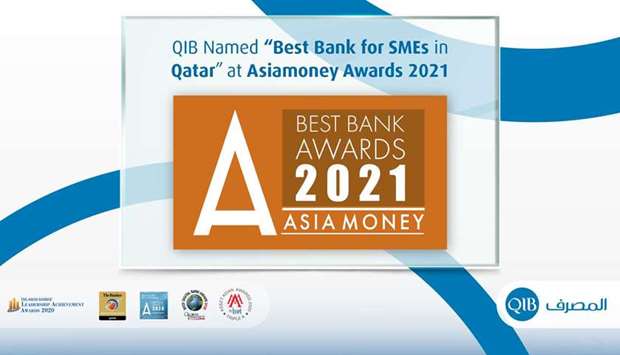Qatar Islamic Bank (QIB) has been chosen as the “Best Bank for SMEs in Qatar” at the Asiamoney Middle East’s Best Bank Awards 2021.
The lender received the award after meticulous evaluation of its small and medium enterprises or SMEs offering against strong competition from leading banks in the increasingly competitive Qatari market.
This recognition is a testament to QIB’s SME-centric approach toward providing innovative financial services to SMEs, which are a vital component to Qatar’s national economy, and to its efforts in supporting the growth of the country’s private sector.
QIB’s SME offering includes a host of innovative products and services catered toward fulfilling the banking requirements of this vital sector, including the Aamaly (My Business) programme, which offers tailored products and services to SMEs in Qatar.
The programme offers entrepreneurs financial services, advice, and guidance, and features several benefits for SMEs, including a special SME-dedicated banking center, 24-hour banking, WPS integration, cash and cheque collection, accounts, and time deposits, together with flexible lending and financing options.
"We will continue to support this vital sector which represents one of the pillars of our national economy which is in tandem with Qatar’s National Vision 2030 and beyond. Innovation and digitisation will remain the cornerstones of our SME programme, as we strive to introduce more innovative and secure financial products and services in the market to meet and exceed our SME customers’ needs and expectations,” said Tarek Fawzi, general manager (Wholesale Banking Group).
QIB has continued to contribute significantly to Qatar Development Bank’s (QDB) Al Dhameen programme, which encourages SMEs to acquire the suitable financing from banks to grow their businesses, in addition to other initiatives launched by QDB to offer easier access to financing for Qatari SMEs.
The bank also played a "significant" role in the proactive national response to the economic implications of the Covid-19 crisis on SMEs and has postponed financial installments for SMEs. It continues to offer financial facilities and ease restrictions on SMEs to help mitigate the impact of the pandemic on the country’s private sector.

